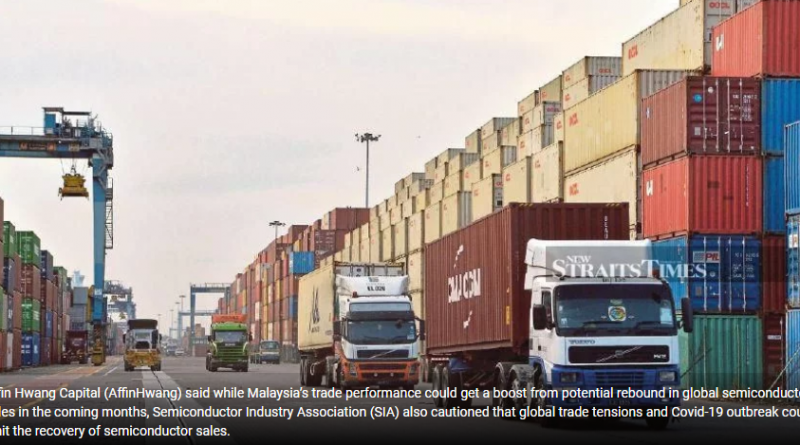Malaysia’s export growth to improve 1.5pct in 2020: AffinHwang
KUALA LUMPUR: Malaysia’s export growth is expected to hinge on the development of the virus outbreak globally as well as direction of commodity prices, particularly oil and palm oil.
Affin Hwang Capital (AffinHwang) said while Malaysia’s trade performance could get a boost from potential rebound in global semiconductor sales in the coming months, Semiconductor Industry Association (SIA) also cautioned that global trade tensions and Covid-19 outbreak could limit the recovery of semiconductor sales.
It said it expects Malaysia’s export growth to improve 1.5 per cent in 2020 (-1.7% in 2019), with import growth of 2.5 per cent (-3.5% in 2019).
“With import growth higher than export, we expect the trade balance to narrow slightly but remain large at around RM131 billion projected for 2020 (RM137 billion in 2019),” it said in a note today.
AffinHwang said in the coming months, Malaysia’s trade performance is expected to be weighed down by the negative impact of the Covid-19 impact from prolonged global supply chain disruptions.
“This has already been reflected in global manufacturing PMI, which fell to its lowest level since May 2019 to 47.2 in February (50.4 in January) as international trade was disrupted by the virus outbreak,” it said.
It said the drop in China’s manufacturing PMI (Purchasing Managers’ Index) to a 16-year low is also a concern for Malaysia’s external demand as China is one of its main trading partners.
In January, China accounted for 12.4 percent of Malaysia’s total exports.
“Furthermore, the rising number of confirmed cases outside of China especially in Japan and South Korea, may likely indicate the possibility of a prolonged disruption to the global supply chain especially for E&E (electrical and electronics) and auto industries.
“In addition, we believe that unless there are more rollbacks to existing tariffs on China’s imports to the US, trade talk uncertainties will also be a headwind for export growth as we expect any progress towards a Phase two deal between US and China to only occur in 2021,” it said.
Source: NST


